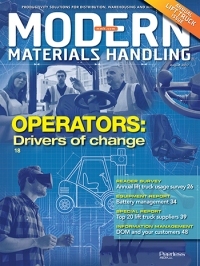Lift Truck Tips: No shortcuts to quality operators
Time, money and an ongoing commitment ensure an effective training program, and anything less can jeopardize productivity, profits and safety.
The art and science of building a team of forklift operators has changed in recent years. Extreme peaks, labor shortages and the growing sophistication of forklifts and related systems have all conspired to keep labor expenses at the top of a facility’s costs. The need for rapid onboarding and better-than-average operator performance means body count is no longer enough. To preserve the productivity, safety and sustainability of a team of operators requires new thinking about training and cost management.
David Hoover, founder and president of Forklift Training Systems, says training practices suffer from at least three major pitfalls: unrealistic expectations, improper screening and bad habits. Training takes time and management’s unrealistic expectations can quickly snowball into big and expensive problems, Hoover says.
“It’s an industry-wide problem,” he says. “A higher up might pride themselves on knowing peak season is coming, but then expect human resources and trainers to snap their fingers and instantly create forklift operators. Would you take a guy off the street with no experience and let him run a 100-ton press or a CNC machine? No, you need mentoring and practice. Then why would you do that with a large, complex, dangerous piece of equipment like a lift truck?”
The pressure can result in poor screening practices. Some companies are compelled not to fail a new hire because they will be short one operator, Hoover says.
“Companies are often not screening properly when they hire and ask the wrong questions such as ‘do you have a current forklift license?’” he says. “I just found an Internet ad that says I can be a certified forklift operator in 30 minutes for $38. Many companies will hire based on a so-called forklift license, thinking it means the candidate had some prior training, but that is not always the case. If you grandfather them or assume this or that, it can burn you really hard.”
Instead, Hoover recommends asking questions like:
- Have you ever driven a forklift in the past?
- If so, for how long and how long ago?
- What types of forklift have you used?
- What application did you use one in?
In addition to a sit-down interview, Hoover says putting a potential operator through a hands-on interview with trainers can help determine if a candidate is a good hire and how much time the operator needs to get up to speed.
“No program in the country, as far as I know, is designed to take a forklift operator from zero experience and turn them into a real pro,” he says. “If each new hire could spend a day in a class along with 30 hours practice time, I would expect the person to be fairly comfortable and proficient. The problem is the numbers for that type of time and money commitment don’t work very well at most companies.”
Once the initial training is complete, it’s best to continuously leverage the wisdom of experienced operators. Some might qualify as full-blown classroom trainers while others might serve as mentors who can provide a supervised and safe training area for workers.
“Many companies believe that any road will get you there,” Hoover says, “but companies who feel they can accomplish training super-fast and on-the-cheap might be in for a terrible surprise.”

Article Topics
Lift Truck Tips News & Resources
Overlooked no more: The importance of lift truck inspections Lithium transition: It’s all about the outcomes Safety for automatic guided vehicle (AGV) environments Assessing the move to lithium Leasing’s fleet management upside Managing for lift truck operator safety Narrow aisle success: Think systems, then trucks More Lift Truck TipsLatest in Materials Handling
Registration open for Pack Expo International 2024 Walmart chooses Swisslog AS/RS and software for third milk processing facility NetLogistik partners with Vuzix subsidiary Moviynt to offer mobility solutions for warehouses Materials Handling Robotics: The new world of heterogeneous robotic integration BSLBATT is looking for new distributors and resellers worldwide Lucas Watson appointed CSO for Körber’s Parcel Logistics business in North America Hyster recognizes Dealers of Distinction for 2023 More Materials HandlingAbout the Author
Subscribe to Materials Handling Magazine

Find out what the world's most innovative companies are doing to improve productivity in their plants and distribution centers.
Start your FREE subscription today.
April 2024 Modern Materials Handling

Latest Resources












